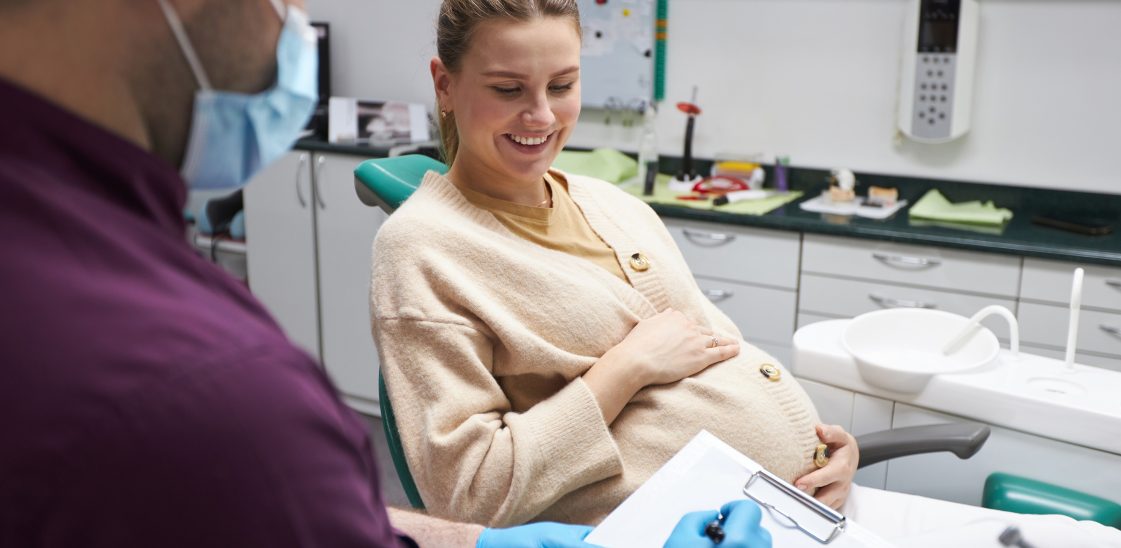
What dental treatment is safe during pregnancy?
Keeping yourself fit and healthy when you’re pregnant is very important, and your oral health is no exception. But it’s important to know that not all dental treatments are appropriate for pregnant women. In many cases, this doesn’t mean you won’t get treatment. Instead, the treatment may be modified slightly to be safe, or in the worst case scenario, it may be postponed until after you’ve had your baby.
Read on to learn more about dental treatments in pregnancy.
How does pregnancy affect dental treatment?
When treating pregnant patients, dentists must think not only about the safety of the procedure for their primary patient, but also for the unborn child. It is perfectly safe to have check ups and many dental procedures while pregnant, but it’s important to let your dentist know that you’re pregnant just in case that has any bearing on your treatment options.
It’s also a good idea to inform your dentist of your pregnancy as they will be able to give you information and advice on navigating pregnancy-related conditions that can affect your oral health. These might include morning sickness and pregnancy gingivitis. If you have treatments booked in already, your dentist will be able to advise you on the best course of action and answer any questions you may have[1].
Is dental anaesthesia safe during pregnancy?
Dental anaesthesia is used to relax you, numb pain or render you unconscious while a procedure is carried out. It can be a very useful aid for dental treatments, but if you’re pregnant you might feel anxious about having any kind of anaesthesia.
In the case of both local and general anaesthesia, it’s vital that your dentist knows you are pregnant. They might decide to give you a smaller dose of anaesthesia, or it may be that your treatment isn’t essential and can wait until after you’ve had the baby. However, some things, such as fillings or cavity repairs, are best done sooner rather than later to avoid the condition getting worse.
While it’s of course important to be aware of what you’re putting into your body while pregnant, you need to consider both the pros and the cons of having dental anaesthesia. If you decide to go ahead with treatment because putting it off would be dangerous, not having enough pain relief could put stress on the baby. The best thing to do is to see your dentist about any oral health issues you have, and discuss the situation with your midwife and your dentist to decide whether to have anaesthesia or not[2].
Are dental x-rays safe in pregnancy?
If you go to the hospital while pregnant, you’ll likely be advised not to have an x-ray unless it is an emergency situation. This is because there is a chance that the radiation involved in the procedure may have an effect on your baby. Because of this, many women are wary of having dental x-rays. However, dental x-rays are considered to be safe during pregnancy.
This is because dental x-rays use a very small amount of radiation to produce images. While some countries still use lead aprons, UK dentists don’t do this anymore as the amount of radiation is so low it is considered harmless. Additionally, dental x-rays are targeted at your mouth and jaw, so your baby isn’t anywhere near the affected area.
If you’re concerned about having a dental x-ray done, you can discuss the pros and cons with your dentist. It’s generally thought that the diagnostic benefits of an x-ray outweigh the minute risks, but if you really don’t want to have an x-ray while pregnant you may be able to postpone it until after the birth. Your dentist will be able to advise you on whether or not postponement is viable based on your current oral health[3].
How to protect your teeth during pregnancy
Accidents can happen at any time, even while you’re pregnant, but there are things you can do to improve your overall oral health. Firstly, you should maintain a healthy oral hygiene routine by brushing for two minutes, twice a day, and using interdental cleaners such as Dentek’s Ultimate Comfort Picks. These interdental brushes feature an ultra-soft bristle brush for cleaning between the teeth as well as a gentle scraper to remove food particles and plaque from the surface of your teeth.
On top of your normal oral hygiene routine, consider using a set of dental guards. Some women experience night-time teeth grinding (also known as bruxism) during pregnancy, which can wear down the enamel and increase tooth sensitivity. Protection such as Dentek’s Maximum Protection Dental Guards puts a barrier between your upper and lower teeth, helping to protect the enamel and guard against tooth sensitivity.
Finally, make sure you’re eating a healthy diet. Pregnancy cravings can make you want all sorts of things, but eating lots of acidic or sugary foods can have a big impact on your teeth. Make sure to rinse your mouth with water after every meal and try to limit those acidic or sugary foods where you can. Don’t brush your teeth within 30 minutes of eating – or of being sick, if morning sickness is taking its toll. Instead, rinse your mouth with water or a fluoride mouthwash[1].
Resources:
[1] https://www.nhs.uk/pregnancy/related-conditions/common-symptoms/bleeding-gums/
[2] https://www.ncbi.nlm.nih.gov/pmc/articles/PMC5564152/ Lee, Ji Min, and Teo Jeon Shin. “Use of local anesthetics for dental treatment during pregnancy; safety for parturient.” Journal of dental anesthesia and pain medicine vol. 17,2 (2017): 81-90. doi:10.17245/jdapm.2017.17.2.81
[3] https://www.nhs.uk/pregnancy/related-conditions/common-symptoms/bleeding-gums/




